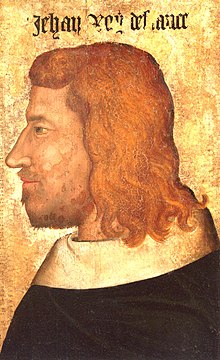John II of France
| John II | |
|---|---|

Portrait of John painted on wood panel around 1350, Louvre Museum
|
|
| King of France | |
| Reign | 22 August 1350 – 8 April 1364 |
| Coronation | 26 September 1350 |
| Predecessor | Philip VI |
| Successor | Charles V |
| Born |
26 April 1319 Le Mans, France |
| Died | 8 April 1364 (aged 44) Savoy Palace, London, England |
| Burial | Saint Denis Basilica |
| Spouse |
Bonne of Bohemia Joan I, Countess of Auvergne |
| Issue |
Charles V of France Louis I, Duke of Anjou John, Duke of Berry Philip II, Duke of Burgundy Joan, Queen of Navarre Marie of Valois, Duchess of Bar Isabella, Countess of Vertus |
| House | Valois |
| Father | Philip VI of France |
| Mother | Joan of Burgundy |
| Religion | Roman Catholic |
John II (French: Jean II; 26 April 1319 – 8 April 1364), called John the Good (French: Jean le Bon), was a monarch of the House of Valois who ruled as King of France from 1350 until his death.
When John II came to power, France was facing several disasters: the Black Death, which caused the death of nearly half of its population; popular revolts known as Jacqueries; free companies (Grandes Compagnies) of routiers who plundered the country; and English aggression that resulted in disastrous military losses, including the Battle of Poitiers of 1356, in which John was captured.
While John was a prisoner in London, his son Charles became regent and faced several rebellions, which he overcame. To liberate his father, he concluded the Treaty of Brétigny (1360), by which France lost many territories and paid an enormous ransom.
In an exchange of hostages, which included his second son Louis, Duke of Anjou, John was released from captivity to raise funds for his ransom. Upon his return in France, he created the franc to stabilize the currency and tried to get rid of the free companies by sending them to a crusade, but Pope Innocent VI died shortly before their meeting in Avignon. When John was informed that Louis had escaped from captivity, he voluntarily returned to England, where he died in 1364. He was succeeded by his son Charles V.
John was nine years old when his father had himself crowned as Philip VI of France. Philip VI's ascent to the throne was unexpected: because of the Salic law, all female descendants of his great uncle Philip the Fair were passed over; it was also disputed because it bypassed the claim of a more direct relative of Philip the Fair, his grandson, Edward III of England. Thus, as new King of France, Philip had to consolidate his power in order to protect his throne from rival claimants; therefore, he decided to marry off his son John quickly at the age of thirteen to form a strong matrimonial alliance, at the same time conferring upon him the title of Duke of Normandy.
...
Wikipedia
